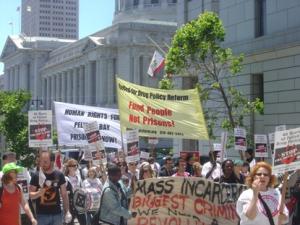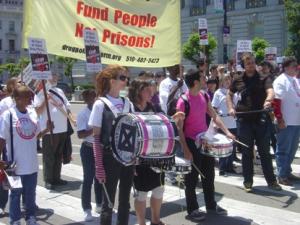It was 40 years ago Friday that President Richard Nixon (R) declared illegal drugs "public enemy No. 1" and ushered in the modern war on drugs. Four decades, millions of drug arrests, and a trillion dollars later, the sale and consumption of illicit drugs is as firmly ensconced in American society as ever, and a growing number of Americans are ready to end drug prohibition and embark on a more sane and sensible, not to mention less harmful, approach toward drugs.

Messages varied from city to city -- in California, demonstrators focused on prison spending during the budget crisis; in New Orleans, the emphasis was on racial injustice and harsh sentencing -- but the central overarching theme of the day, "No More Drug War!" was heard from sea to shining sea and all the way to Hawaii.
In San Francisco, several hundred people from more than a dozen sponsoring organizations gathered at City Hall for a press conference and to demand that Gov. Jerry Brown (D) and the state legislature prioritize vital social services over spending on prisons. Then, accompanied by drummers from the Brass Liberation Orchestra, they marched through the city center to state office buildings before returning to City Hall.
"It is past time that we take real steps to make real changes to California’s totally inhumane prison system," said Emily Harris, statewide coordinator for Californians United for a Responsible Budget (CURB), one of 17 local groups organizing the march.

"We call on the governor, California's mayors, police chiefs and sheriffs, and all Californians to join us in calling it a failure that should be stopped immediately," said Dr. Diana Sylvestre of Oasis Clinic and the Oakland-based United for Drug Policy Reform. "We will continue to organize to win our fight against this endless assault on sane drug policies."
In Chicago, hundreds gathered outside James R. Thompson Center in the Loop to commemorate the 40th anniversary of the drug war, while inside the center was a ceremony honoring Juneteenth, a remembrance of the signing of the Emancipation Proclamation by President Lincoln in 1863. For those present, the connection between the struggle to win civil rights and the fight to end the drug war was easily made. Cook County Board President Toni Preckwinkle, Father Michael Pfleger and other community leaders lent their voices to the rally.
"We all know that the war on drugs has failed to end drug use. Instead, it's resulted in the incarceration of millions of people around the country, and 100,000 here in Cook County on an annual basis," said Preckwinkle, the only elected official to address the crowd. "Drugs and the failed war on the drugs have devastated lives, families and communities. For too long we've treated drug use as a criminal justice issue, rather than a public issue, which is what it is."
In Honolulu, the ACLU of Hawaii and other drug reform advocates marked the occasion with a rally and speeches. Access to medical marijuana was a big issue for attendees there, although the main focus was on ending the drug war.
"It has cost a trillion dollars. It has perpetrated massive racial injustice. It has made the United States the largest jailer," said Scott Michaelman. "Treatment over incarceration is a core part of our message. Low level nonviolent users should not be a part of the criminal justice system," he added.
"You get to see the people coming together. It's a unity thing," Keyondria Mitchell, a supporter who led one of the dancing groups, told the Pelican Post. She said the event's varied attendees were testament to a changing public perception of the drug war. "That's what you want, awareness."
Women with a Vision director Deon Haywood said that 40 years on, the drug war had failed to make us safer despite all the money down the drain. "It hasn't curbed the use of illegal drugs, but what it has done is incarcerate many people," said Haywood. "We have only two licensed addiction counselors serving three parishes: Orleans, Plaquemines, and St. Bernard. Why can't that money be put into treatment?"
In San Diego, dozens gathered at Pioneer Park in Mission Hills to hear, among others, former California Assemblymember Lori Saldana call for complete repeal of drug prohibition; in Denver, the Drug Policy Alliance sponsored a well-attended debate; and in Portland, Oregon, the Lewis & Clark chapter of Students for Sensible Drug Policy organized a candlelight vigil at Pioneer Square attended by around 100 people. Events also occurred in other cities, including Ann Arbor, Miami Beach, and Washington, DC.
The crowds didn't compare to those who gather for massive marijuana legalization protests and festivals -- or protestivals -- such as the Seattle Hempfest, the Freedom Rally on Boston Commons, or the Ann Arbor Hash Bash, or even the crowds that gather for straightforward pot protests, such as 420 Day or the Global Marijuana March, but that's because the issues are tougher. People have to break a bit more profoundly with drug war orthodoxy to embrace completely ending the war on drugs than they do to support "soft" marijuana. That relatively small groups did so in cities across the land is just the beginning.
This work by StoptheDrugWar.org is licensed under Creative Commons Attribution-ShareAlike 4.0 International
Comments
Tell your Congressional Representatives -
Tell your Congressional Representatives -
It is time to "Change the Schedule of Cannabis, Cannabis Laws, and Drug Czar Laws"
Read and Sign the petition at
http://www.change.org/petitions/change-the-schedule-of-cannabis-cannabis…
After you sign the petition, email your friendlies, share on facebook, or twitter from the petition page. If you have a website grab the widget so your visitors can sign it without leaving your website.
This petition uses laws passed by Congress to point out that by their laws, the laws must change.
Alcohol is a factor in the following:
* 73% of all felonies * 73% of child beating cases * 41% of rape cases * 80% of wife battering cases * 72% of stabbings * 83% of homicides.
-A study by the RAND Corporation found that every additional dollar invested in substance abuse treatment saves taxpayers $7.46 in societal costs.
-$1 spent on treatment will achieve the same reduction of flow of cocaine as $7.3 spent on enforcement.
-$1 spent on treatment will achieve the same reduction of flow of cocaine as $10.8 spent on border control.
-$1 spent on treatment will achieve the same reduction of flow of cocaine as $23 spent trying to persuade Colombian farmers to grow crops other than coca.
Source: Rydell, C. P., Caulkins, J. P., & Everingham, S. S. (1996). Enforcement or treatment? Modeling the relative efficacy of alternative for controlling cocaine. Operations Research (RAND), 44(5), 687-695.
?
In an other resent study, Mortality Within the First 2 Years in Infants Exposed to Cocaine, Opiate, or Cannabinoid During Gestation - pediatrics.aappublications.org A total of 2,964 infants were drug-tested at birth to see if they were positive for drugs - cocaine, opiates and cannabis were studied and compared to drug free infants. During the first two years of their lives, 44 babies from the original group died. The death rates were :
"No drugs at birth" deaths….…..15.7 deaths per 1000 live births
"Cocaine positive" deaths………17.7 deaths per 1000 live births
"Opiate positive" deaths…….….18.4 deaths per 1000 live births
"Cannabis positive" deaths…….. 8.9 deaths per 1000 live births
The "cannabis positive" infants rate of death is almost half of what the "No drugs" infants death rate is! When it comes to failure to thrive, cannabis shows a significant improvement in the outcome.
If the body is low on cannabinoids, just as with any other deficiency, the body does not function correctly since the endocannabinoid system regulates all other systems in the body. Misinformation has done much damage over the last 73 years as has the war on a plant and those who use it. Cannabis has continually been shown to be a remarkable anti-inflammatory which could be of great help to the 86 million people that suffer chronic pain. No one ever died from cannabis/marijuana though much suffering has taken place from the prohibition of it. It is time to end this travesty.
  Like many modern vehicles,
Like many modern vehicles, the 944 series Porsche uses a hydraulic clutch actuation system. This is in contrast to a mechanical cable operated system found on the 924 series and other earlier Porsches. The reasons for using a hydraulic system as opposed to cable are smoother operation with less pedal effort, and ease of maintenance with greater reliability. I suspect that if you are reading this, you are probably questioning the notion of reliability though.
Add new comment